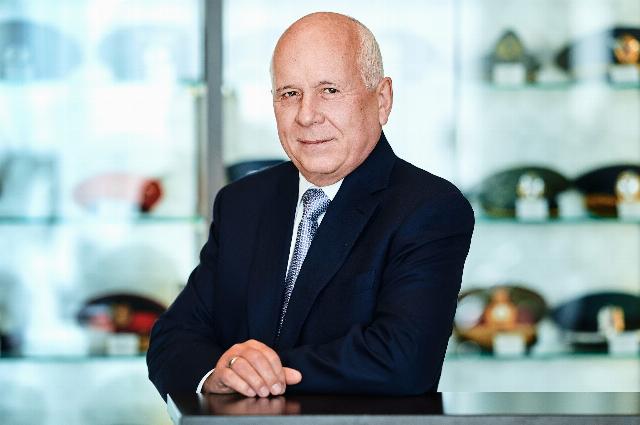Sergey Chemezov, Head of Rostec State Corporation and Chairman of the Union of Machine Builders of Russia, held a meeting of the Bureau of the Union of Machine Builders of Russia and the League for Assistance to Defense Enterprises. The event was also attended by Vladimir Gutenev, First Vice-President of the Union, head of the League, Anton Alikhanov, Minister of Industry and Trade, Valery Falkov, Minister of Science and Higher Education, State Duma deputies, heads of large industrial enterprises. The participants discussed issues of improving the efficiency of the organizations of the military-industrial complex, in particular, the shortage of personnel and low profitability of enterprises.
According to Sergey Chemezov, the military-industrial complex, the development of which is given great attention by the President of Russia, along with the implementation of the State Budget, creates groundwork in high-tech civilian areas for the post-victory period. "The value of the defense industry is growing rapidly. We not only equip our fighters in the SWO zone with everything necessary, but also actively participate in the implementation of important civilian projects, contribute to the achievement of large–scale goals of national development of our country," he stressed.
Anton Alikhanov, Minister of Industry and Trade of the Russian Federation, also noted the significant role of the defense industry in the development of industry: "For a wide range of components, it was necessary to largely rebuild cooperative ties at several levels deep into this chain. About 850 enterprises that had not previously interacted with the defense industry at all were involved in this task. And if now civilian enterprises are helping defense companies fulfill the order, then tomorrow the defense industry will become a powerful driving force for gaining technological sovereignty and gaining technological leadership."
Vladimir Gutenev, First Vice-President of the Union, spoke about the work of expert platforms at the State Duma Committee on Industry and Trade. Their main task, he stressed, is not only to transform the legislative field, but also to enforce the proposed changes.
"The mechanisms of formation of the state defense order do not give manufacturers motivation to reduce costs in the production of serial products under long-term contracts. Additional profits could be used to raise salaries, modernize production facilities, and create innovative products," he said.
Vladimir Gutenev added that the necessary documents addressed to Deputy Head of the Presidential Administration Maxim Oreshkin and Chairman of the Government of the Russian Federation Mikhail Mishustin with proposals for the transformation of the regulatory framework have already been prepared. They are aimed, first of all, at establishing an enlarged composition of costs attributed to the cost of production under the state Budget; simplifying the procedure for state support for research and development; establishing increased profitability of state contracts for organizations that create scientific and technical groundwork for the development of weapons, military and special equipment.
Peter Fradkov, Deputy Chairman of the Union of Machine Builders of Russia, Chairman of PJSC Promsvyazbank, in turn, listed the areas of work in the banking sector that will contribute to the development of the defense industry. According to him, "large-scale import substitution projects for critical technologies cannot be placed in a medium-term framework, therefore our planning horizon should be 10-15 years. This will allow enterprises to provide "long-term" money for the implementation of their projects." Such a source, according to Peter Fradkov, can be bond financing. Thus, defense industry enterprises need assistance in entering the stock markets, and banks need additional tools to successfully launch such a mechanism.
In addition, one of the key problems for the industry remains the personnel shortage and the "salary race", therefore, in modern conditions, banks must assume additional functions and obligations in order to actively participate in the implementation of personnel development and motivation programs for the defense industry, Peter Fradkov is sure.
Valery Falkov, Minister of Science and Higher Education of the Russian Federation, spoke about the work being done to eliminate the personnel shortage and train highly qualified engineers. So, since 2022, the Ministry of Education and Science of Russia, with the support of the Ministry of Industry and Trade of Russia, has launched the project "Advanced Engineering Schools", in the development of which 50 more schools already created on the basis of universities will have to be selected by 2030.
"We will expand the network of advanced engineering schools thoughtfully, maintaining the quality and high status of the project. To do this, it is important to follow the principles that were originally laid down, and on the other hand, to make sure that advanced schools help in solving the personnel shortage in those industries where regions and enterprises are in the greatest need," the minister said.
Recall that the State Corporation has been involved in the implementation of the federal project "Advanced Engineering Schools" since its launch in 2022 and, in partnership with leading Russian universities, solves a large range of scientific and practical tasks on the basis of the University: conducts promising research and R&D, invests in the material and technical base of universities, the development and implementation of additional vocational education programs, research activities.
So, currently, with the participation of Rostec, 15 advanced engineering schools have been opened in leading Russian universities, and the planned volume of investments in the project this year alone will exceed 1 billion rubles.

